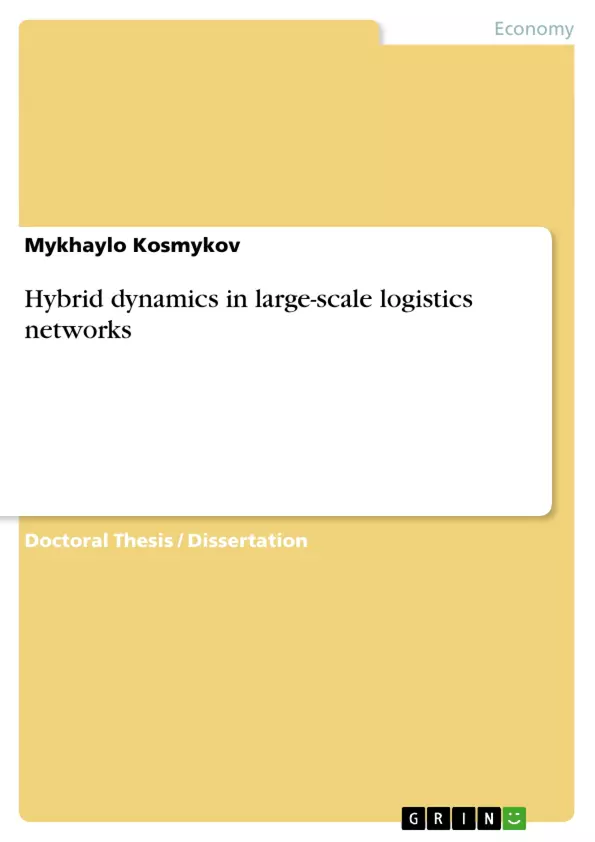We study stability properties of interconnected hybrid systems with application to large-scale logistics networks.
Hybrid systems are dynamical systems that combine two types of dynamics: continuous and discrete. Such behaviour occurs in wide range of applications. Logistics networks are one of such applications, where the continuous dynamics occurs in the production
and processing of material and the discrete one in the picking up and delivering of material. Stability of logistics networks characterizes their robustness to the changes occurring in the network. However, the hybrid dynamics and the large size of the network lead to complexity of the stability analysis.
In this thesis we show how the behaviour of a logistics networks can be described by interconnected hybrid systems. Then we recall the small gain conditions used in the stability analysis of continuous and discrete systems and extend them to establish input-to-
state stability (ISS) of interconnected hybrid systems. We give the mixed small gain condition in a matrix form, where one matrix describes the interconnection structure of the system and the second diagonal matrix takes into account whether ISS condition for a subsystem is formulated in the maximization or the summation sense. The small gain condition is sufficient for ISS of an interconnected hybrid system and can be applied to an interconnection of an arbitrary finite number of ISS subsystems. We also show an application of this condition to particular subclasses of hybrid systems: impulsive systems, comparison systems and the systems with stability of only a part of the state.
Furthermore, we introduce an approach for structure-preserving model reduction for large-scale logistics networks. This approach supposes to aggregate typical interconnection patterns (motifs) of the network graph. Such reduction allows to decrease the number of computations needed to verify the small gain condition.
Inhaltsverzeichnis (Table of Contents)
- Abstract
- Introduction
- Preliminaries
- Hybrid Systems
- Stability of Hybrid Systems
- Interconnected Systems
- Small Gain Theorem
- Stability Analysis of Interconnected Hybrid Systems
- ISS of Interconnected Hybrid Systems
- Mixed Small Gain Condition
- Application to Special Classes of Hybrid Systems
- Model Reduction for Large-Scale Logistics Networks
- Model Reduction Based on Network Motifs
- Structural Properties of Motifs
- Applications to Network Motifs
- Conclusion and Future Work
Zielsetzung und Themenschwerpunkte (Objectives and Key Themes)
This dissertation investigates the stability properties of interconnected hybrid systems, focusing on their application to large-scale logistics networks. The work aims to develop a robust framework for analyzing the stability of such complex systems, considering their hybrid nature and large-scale interconnectedness.
- Stability Analysis of Interconnected Hybrid Systems
- Application of Small Gain Conditions to Hybrid Systems
- Model Reduction Techniques for Large-Scale Logistics Networks
- Structure-Preserving Aggregation of Network Motifs
- Stability Characterization of Logistics Networks
Zusammenfassung der Kapitel (Chapter Summaries)
The first chapters provide an introduction to hybrid systems, their stability properties, and the interconnected systems framework. The small gain theorem, a fundamental tool for stability analysis, is introduced and extended to hybrid systems.
Chapter 4 focuses on establishing input-to-state stability (ISS) for interconnected hybrid systems. The mixed small gain condition is presented, which provides a sufficient condition for ISS and is applicable to a wide range of interconnections. The application of this condition to specific subclasses of hybrid systems, including impulsive systems and comparison systems, is discussed.
Chapter 5 introduces a model reduction approach for large-scale logistics networks. This approach leverages the aggregation of typical interconnection patterns (motifs) in the network graph, enabling a significant reduction in computational complexity for stability analysis.
Schlüsselwörter (Keywords)
This dissertation focuses on the stability analysis of large-scale logistics networks, utilizing interconnected hybrid systems and applying the small gain theorem. The key themes include input-to-state stability (ISS), mixed small gain conditions, model reduction techniques, network motifs, and structure-preserving aggregation. The research aims to contribute to a robust and efficient framework for understanding and controlling the stability of complex logistics networks.
Frequently Asked Questions
What are hybrid systems in the context of logistics?
Hybrid systems combine continuous dynamics (like material processing) and discrete dynamics (like picking up and delivering items) to describe complex network behaviors.
What is the "Small Gain Theorem" used for?
It is a fundamental tool used for the stability analysis of interconnected systems, ensuring that the entire network remains robust despite changes in individual subsystems.
How does model reduction work for large-scale logistics networks?
Model reduction aggregates typical interconnection patterns, known as "motifs," to decrease computational complexity while preserving the essential structural properties of the network.
What is Input-to-State Stability (ISS)?
ISS is a stability property that ensures the internal state of a system remains bounded as long as the inputs to the system are also bounded.
Why is stability analysis important for logistics networks?
It characterizes the network's robustness to changes, ensuring that disruptions do not lead to total system failure in large-scale operations.
- Citation du texte
- Mykhaylo Kosmykov (Auteur), 2011, Hybrid dynamics in large-scale logistics networks, Munich, GRIN Verlag, https://www.grin.com/document/198846



